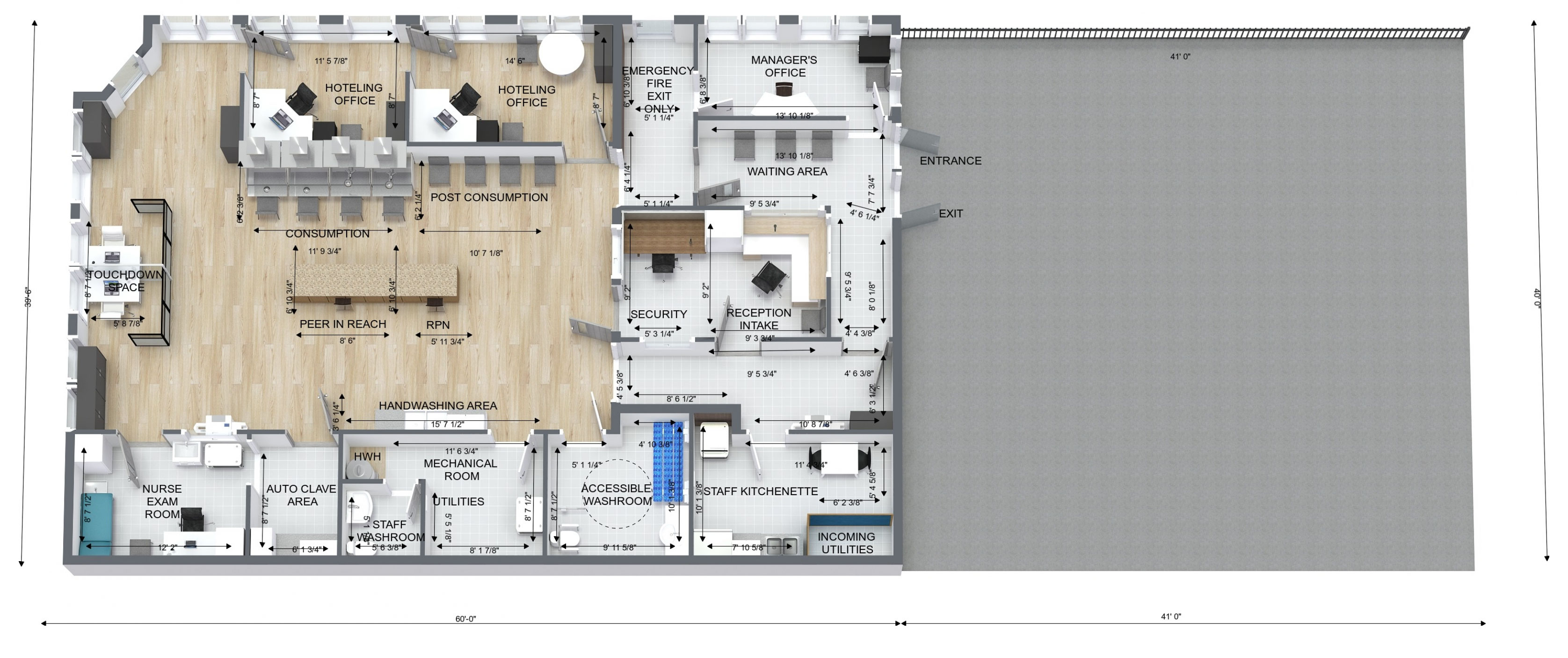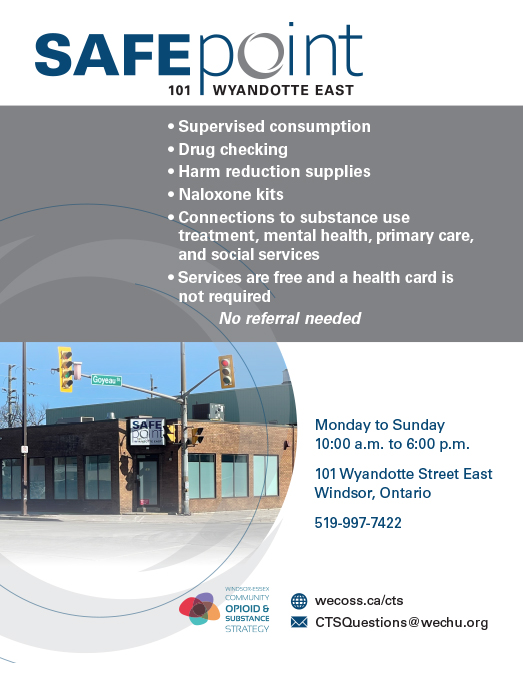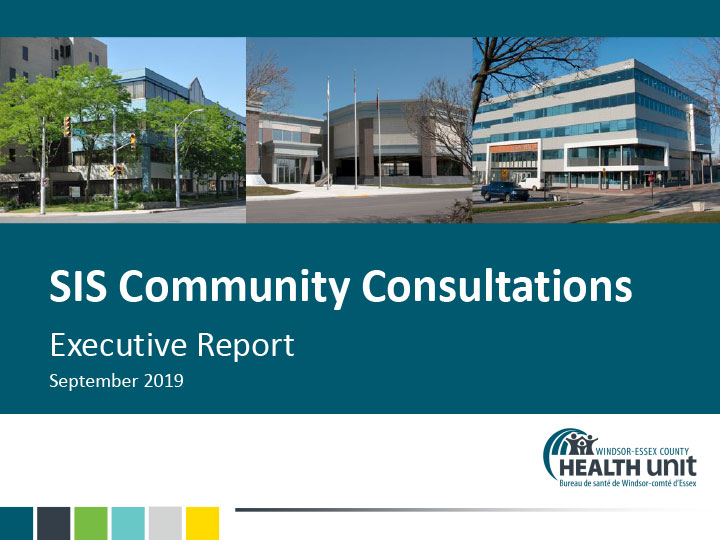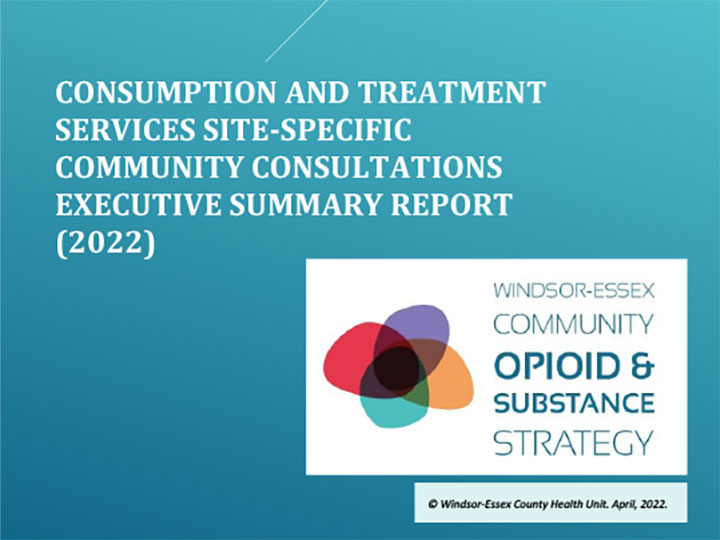Effective January 1st, 2024, there will be a pause in services at SafePoint. During the service disruption, the building will not be open to the public and services will not be available. We encourage you to continue monitoring this website or to subscribe to SafePoint emails below for regular updates. To learn about other services available during the service disruption, click here.

What is SafePoint?
SafePoint at 101 Wyandotte East is a health service that provides a safe space for people to consume pre-obtained drugs under the supervision of medically trained staff.
101 Wyandotte Street East
Windsor, Ontario
519-997-7422
CTSQuestions@wechu.org
Monday to Sunday
10:00 a.m. to 6:00 p.m.
SafePoint offers open house tours every Friday from 8:30 a.m. to 9:30 a.m. on a walk-in basis.
Services Offered at SafePoint
At SafePoint, individuals will be provided with a range of comprehensive, compassionate, and evidence-based services that meet them “where they are at” in their substance use journey. This includes:
- Supervised consumption services
- Distribution of sterile harm reduction equipment and supplies
- Distribution of naloxone kits and training
- Drug checking services
- Basic medical care and support
- Addiction support
- Connections and referrals to substance use treatment and recovery, mental health, primary care, and social services
Subscribe
Receive updates on WECOSS projects and initiatives.
SafePoint operates under a comprehensive wraparound service model to support clients in meeting their health and social needs. The site partners with multiple community organizations to offer wraparound services on-site at scheduled times. The services available are presented in the table below.
|
On-Site Wraparound Services |
||
|
Organization/Program |
Description |
Schedule |
|
Windsor-Essex Community Health Centre (Street Health) |
Street Health offers Hepatitis C testing/education and assistance with health card replacements. |
Every third Friday of the month, starting July, 21st 2023, from 10:00 a.m. – 3:00 p.m. |
|
Breaking Free Online (BFO) App |
The Breaking Free Online App is now available on-site to help clients manage their substance use through self-guided courses, positive coping skills, and behaviour change techniques that promote recovery. |
Available during all operational hours (10:00 a.m. – 6:00 p.m. daily). Clients who are interested in using the app can speak to SafePoint staff for further details. |
|
Recovery Education for Addictions and Complex Trauma (RE/ACT) |
RE/ACT is a program that applies a holistic approach to substance use recovery by focusing on the numerous ways in which trauma shapes people’s lives, thought patterns, behaviours, and health. |
Every Wednesday from 4:00 p.m. – 5:00 p.m. |
SafePoint Poster
News and Updates
News Release: SafePoint Offering Open Houses To Community Ahead Of Launch
Published on Wednesday, April 19th, 2023
With the site preparing for imminent launch, residents, businesses, and other stakeholders are invited to attend open house tours available to the public at 101 Wyandotte Street East.
WECHU Media Statement Regarding Next Steps for SafePoint 101 Wyandotte East
Published on Tuesday, January 31, 2023
We are encouraged by the decision of Councillor Agostino to reconsider last night’s motion, which ensures that renovations and our applications can move forward without delay.
WECHU Media Statement Regarding SafePoint 101 Wyandotte East
Published on Thursday, January 26, 2023
The following statement can be attributed to the Windsor-Essex County Health Unit (WECHU).
WECHU News Release: Three Virtual Town Halls Being Held for Consumption and Treatment Service Site
Published on Monday, January 23, 2023
Businesses, residents, and agencies are invited to have their say at Virtual Town Halls ahead of the opening of the Consumption and Treatment Services Site.
Site Floor Plan

Community Engagement
Public Open House Tours
SafePoint offers open house tours every Friday from 8:30 a.m. to 9:30 a.m. on a walk-in basis. All community members are welcomed to visit the site to learn more about the services offered.
2023 Virtual Town Halls
In preparation for the launch of SafePoint, the Windsor-Essex County Health Unit, in partnership with the SafePoint Stakeholder Advisory Committee, hosted a series of Virtual Town Halls for businesses, residents, and agencies located in the City of Windsor’s downtown core. Three Virtual Town Halls took place between January 24th and January 26th of 2023. Watch a recorded session below.
2019 and 2021 Community Consultations
Community consultations were completed in both 2019 and 2021 to assess the feasibility and levels of support for creating a CTS site in Windsor-Essex County. The findings from these consultations can be found in the following reports:
Full consultation reports can be accessed upon email request to CTSQuestions@wechu.org.
Timeline of Activities for SafePoint
|
Date |
Milestone |
| October, 2018 – April, 2019 | Feasibility study for Consumption and Treatment Services (CTS) conducted. |
| September, 2019 | WECHU Board of Health passes a resolution to proceed with CTS applications. |
| Fall, 2019 – Winter, 2020 | SafePoint Stakeholder Advisory Committee created to guide local planning and decision-making for the site selection and applications. |
| Winter, 2020 – April, 2021 | Site assessment conducted on eligible properties in the City of Windsor’s downtown core. |
| May, 2021 | Two candidate locations identified for a potential CTS site in the City of Windsor’s downtown core. |
| June, 2021 – August, 2021 | CTS Site-Specific Community Consultations conducted to assess levels of support for the candidate locations. |
| April, 2022 | 101 Wyandotte Street East selected as proposed location for a potential CTS based on support from the Site-Specific Consultations. |
| May, 2022 | City of Windsor Council endorses proposed location at 101 Wyandotte Street East. |
| May, 2022 | WECHU submits application to Health Canada for approval to establish an Urgent Public Health Need Site (UPHNS) at 101 Wyandotte Street East. |
| May, 2022 | Building renovations start at 101 Wyandotte Street East. |
| July, 2022 | WECHU submits applications to the Ministry of Health and Health Canada for approval to establish a CTS site at 101 Wyandotte Street East. |
| January, 2023 | “SafePoint” chosen for site name in consultation with community partners and people with lived/living experience. |
| January, 2023 | CTS Virtual Town Halls conducted with downtown businesses, residents, and community agencies to offer information about the site launch. |
| March, 2023 | Health Canada Site Inspection. |
| April, 2023 | SafePoint receives approval to operate from Health Canada |
| April, 2023 | SafePoint open house tours to be facilitated |
| April 26th, 2023 | SafePoint Opens |
| April 26th to December 31st, 2023 | SafePoint is operational and providing services to clients. |
| January 1st, 2024 | SafePoint services are paused due to delays with long-term funding. |
Frequently asked questions
What are the benefits of these services?
Research has shown that CTS sites can result in multiple benefits for both people who use substances and the larger community. By providing a safe and medically supervised space for people to use drugs, CTS sites can:
- Help reduce the risk and occurrence of drug overdoses and deaths
- Reduce risk factors leading to the spread of infectious diseases (such as HIV and hepatitis) by providing harm reduction supplies and drug use equipment
- Increase uptake of withdrawal management and other drug treatment services
- Facilitate connections and referrals to other health and social services
- Reduce incidents of people using their substances in public spaces or disposing equipment in public
- Reduce strain on emergency services for cases involving drug use
Will these services encourage more drug use?
There is no evidence that harm reduction services promote drug use. These services are mainly used by individuals with a history of drug use and those who are the highest risk for overdose.
Additionally, there is no evidence that sites prevent people from stopping their use of drugs or cause people to start using drugs after a period of not using.
Will these services result in declined property values or reduced neighbourhood image?
To date, research has not looked at the impact of these services on property values. However, in Toronto, it was found that supportive housing programs (including those for individuals with substance use issues) did not have an impact on surrounding property values.
Are these services proven to be successful in other areas?
Evaluations conducted on sites located in areas close to Windsor, including London, Guelph, Waterloo, and Ottawa, have shown that these sites have been successful in achieving their intended goals.To read the full reports, click the links below:
- Middlesex-London Health Unit Report
- Wellington-Dufferin-Guelph Public Health
- The Region of Waterloo and Sanguen Health Centre
- Ottawa Public Health Report
Should the WECHU be focusing on prevention and treatment instead?
This site provides a safe space for people to use drugs in a supervised environment, which aids in reducing fatalities, but also builds trust between clients and peers/service providers. If a client who visits the site decides to pursue treatment, peers/service providers employed at the site can refer them to treatment services available in the community that align with their chosen pathways to recovery, allowing for autonomy over their own health and well-being. Recovery and rehabilitation looks different for everyone, with this service/site representing one of the many pathways available on the continuum of recovery.
The WECOSS uses a four-pillar based approach to address substance use issues at the community level (Prevention and Education, Treatment and Recovery, Enforcement and Justice, and Harm Reduction), with the creation of a CTS site representing one part of this comprehensive drug strategy. Work will continue with the four pillars of the WECOSS as the services of the CTS site are delivered.
Are these services legal?
Yes. In Canada, supervised consumption services operate under an exemption to Section 56.1 of the Controlled Drugs and Substances Act (CDSA).
The exemption allows for the operation of the site without the risk of its clients or staff being charged with the crime of having illicit drugs. Through the exemption, the services delivered at a site are deemed necessary for medical purposes or for public interest.
Why is SafePoint needed in the downtown core?
Local data demonstrates that the greatest proportion of opioid-related deaths reported historically in Windsor-Essex County are amongst individuals who reside in the N9A postal code area or the downtown core. As such, this neighbourhood was identified as a priority area for the site.
What other services are offered at SafePoint?
Services will include supervised consumption, the distribution of harm reduction supplies and education, basic medical care, and on-site access or referrals to health/social services, including substance use treatment, mental health supports, primary care services, and social services (e.g., housing, income support).
Who can access SafePoint?
The service is targeted to individuals who use drugs. No referral will be required to access the service, as it will be a walk-in service, but direct referrals will be welcomed from community partner agencies.
How many consumption booths does SafePoint have?
The site will have four consumption booths.
What methods of consumption will be available?
The methods of consumption that will be available are injection, intranasal, and oral consumption.
What is the role of the SafePoint Advisory Committee? Who is involved?
The SafePoint Advisory Committee guides local planning and decision-making processes for the creation of a local CTS site. These activities include supporting the selection of the site, the consultation and application processes, and ongoing program planning.
The SafePoint Advisory Committee is comprised of representatives from the following organizations:
- Windsor-Essex County Health Unit
- Windsor Police Service
- Pozitive Pathways Community Services
- Hôtel-Dieu Grace Healthcare
- City of Windsor
- Essex-Windsor EMS
- Family Services Windsor-Essex
- Windsor-Essex Community Health Centre
Will this service increase crime in the downtown core?
Evidence shows that these sites are safe and do not contribute to more crime in the neighborhoods where they are located. Sites are located in neighborhoods where there is a demonstrated need and aim to reduce the impacts of drug use on the community to enhance safety for both clients and the public. They promote safety for clients by supporting the use of sterile/new drug use supplies (reduces risks of transmitting blood borne infections), and by having supervision of drug use on site to help reduce risks of overdose/overdose harm. They also promote public safety by helping to reduce: 1) rates of public drug use; 2) rates of publicly discarded drug equipment; and 3) the transmission of blood borne infections.
Studies have found that crime rates have not increased in other areas that have a local site.
All local partners on this project are committed to maintaining a safe environment.
Will these services result in an increase in improperly disposed of needles and syringes in the downtown area?
Evidence collected in other regions across Ontario demonstrate that CTS sites have the potential to reduce the number of improperly disposed of needles and syringes in areas surrounding the site.
Consumption will occur on site with disposal bins at each station and outside of the building. Neighbourhood sweeps will also occur 3 times a day (or more often, as required) within the 15m perimeter of the site to pick up discarded equipment. Community members may also report supplies that may be improperly disposed of within the 15m perimeter surrounding the site by submitting the feedback form available on this page.
What types of security measures are in place at the site?
Security measures that will be implemented at SafePoint include:
- A comprehensive security plan/policy and floor plan, designed in consultation with the Windsor Police Service
- Full-time security guard
- Client Code of Conduct will explain rules related to site safety
- Safety and security training for all staff
- Continued partnership with the Windsor Police Service.
Did the WECHU consult the community about SafePoint?
Yes. Consultations have been completed, including a number of focus groups and online surveys.
Specifically, community consultations took place in both 2019 and 2021 to assess the acceptability and feasibility of a CTS site in WEC. Read the reports here:
Supervised Injection Services Community Consultations Executive Summary Report 2019
CTS Site-Specific Community Consultations Executive Summary Report 2021
Additionally, Virtual Town Halls were held in 2021 and 2023 to provide community members with an opportunity to receive information and ask questions about the site. These sessions were recorded and can be watched here:
Input will continue to be gathered throughout the project.
Who can I contact if I have questions or concerns about SafePoint?
Community members can voice any questions and concerns about the site via the online feedback form on this page or by emailing CTSQuestions@wechu.org. Site operators are committed to responding to questions/concerns received in a timely manner.
How can I get involved in learning more about SafePoint?
All information and updates about SafePoint will be published to this webpage. If you would like to be a part of ongoing engagement, register for email subscriptions under the “Subscribe” section at the top of the page.




